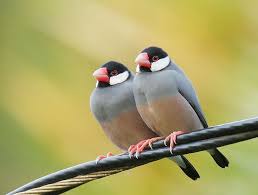
Java Sparrow
Conditions of detention
Java Sparrows require a spacious cage or aviary that allows for ample movement and social interaction. The cage should be equipped with perches, swings, and toys to keep them entertained. It’s important to place the cage in a well-lit area away from drafts and direct sunlight.
Useful Fact: Java Sparrows are social birds and thrive in pairs or small flocks. They enjoy the company of other finches and can become stressed if kept alone, so it is recommended to keep them in groups whenever possible.
Nutrition and diet
A balanced diet for Java Sparrows includes a high-quality finch seed mix or pellets supplemented with fresh fruits and vegetables. Foods such as millet, canary seed, spinach, kale, and small amounts of grated carrot are excellent choices. Grit and cuttlebone should also be provided to aid digestion and provide calcium.
Useful Fact: Java Sparrows are granivorous, meaning they primarily eat seeds. However, providing fresh greens and occasional fruit can help supply additional nutrients and variety in their diet.
Health
Java Sparrows are generally hardy birds but can be prone to certain health issues such as respiratory infections, mites, and nutritional deficiencies. Regular observation and maintaining a clean environment are essential for preventing diseases.
Useful Fact: Monitoring their droppings for changes in color or consistency can provide early indicators of health problems. Regular veterinary check-ups can help ensure they remain healthy.
Grooming and care
Java Sparrows groom themselves by preening their feathers and enjoy bathing. Providing a shallow dish of water for bathing or misting them lightly with water can help maintain healthy feathers.
Useful Fact: Regularly cleaning the cage and providing fresh bedding helps prevent the spread of parasites and bacteria.
Education and training
Java Sparrows are not typically trained like parrots, but they can become accustomed to their owner’s presence and routines. Handling should be gentle to avoid stress.
Useful Fact: Java Sparrows appreciate a predictable environment and routine, which can help reduce stress and encourage natural behaviors.
Toys and entertainment
While Java Sparrows do not engage with toys like parrots, they enjoy exploring their environment and foraging for food. Providing different textures and surfaces for them to interact with can help keep them engaged.
Useful Fact: Providing natural branches and chewable toys can help satisfy their instinct to gnaw and explore.
Safety
Ensure that the cage is free of sharp edges and that the bar spacing is appropriate to prevent escape or injury. Keep them away from toxic substances, including certain household plants and fumes.
Useful Fact: Avoid using non-stick cookware around Java Sparrows, as the fumes can be toxic and even fatal to birds.
Accessories
Java Sparrows require nesting boxes or platforms for breeding and resting. Providing perches of varying sizes and materials can help maintain foot health.
Useful Fact: Nesting materials such as straw, twigs, and leaves should be provided to encourage natural nesting behaviors.
Socialization
Java Sparrows are social birds and thrive in flocks. They form strong bonds with each other and enjoy interacting with their flock mates and human caregivers.
Useful Fact: Spending time observing and interacting with your Java Sparrows can help build trust and strengthen your bond with them.
Travel and Transportation
When traveling with Java Sparrows, use a secure and well-ventilated travel carrier. It’s important to keep the carrier covered during transport to reduce stress.
Useful Fact: Acclimating Java Sparrows to the travel carrier before trips can help reduce stress and anxiety during transport.
Behavior and psychology
Java Sparrows exhibit a range of behaviors and vocalizations that indicate their mood and health. Understanding these signals is essential for proper care.
Useful Fact: Java Sparrows are known for their pleasant chirping and social interactions, which are important aspects of their communication and bonding.
Legal aspects
In some areas, Java Sparrows may be subject to specific regulations due to their potential impact on local ecosystems if they escape into the wild. It is important to ensure compliance with local laws regarding pet ownership and breeding.
Useful Fact: Always check local regulations to ensure compliance with laws regarding pet ownership and breeding, as some areas may have specific requirements.


